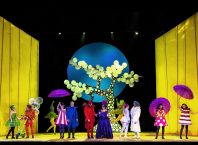I often hear people complain that Israel is losing its Jewish flavor. The school systems are barely teaching Judaic history and many secular Jews haven’t a clue about basic religious rituals. I have no interest in debating this statement, nor do I wish to attest to its validity or falsehood. Regardless of this alleged slippery slope, there is no doubt that Israeli life is molded around the Jewish calendar, and that Rosh Hashanah is in the air. Synagogue attendance may be down and fewer children may know exactly why they are eating apples and honey, but Supersal is sure to have them on sale, with a complimentary honey cake if you spend over one hundred Shekels. Egged buses flash Shana Tova across the screen and random people on the street wish you a ‘Shana Tova’ (Happy New Year).
It is around the holidays that I am reminded of my love for Israel and its prickly, eclectic rough and tumble people. I was at the supermarket yesterday, and an older Russian woman was ahead of me in line. She looked dubiously at my four small items and in broken Hebrew gesticulated at the express line, telling me I would be able to get out of the mob like pre-Rosh Hashana supermarket scene more efficiently if I waited in line with the other less laden shoppers. I glanced over at the other queue, full of disgruntled ten-or-less-item shoppers that snaked around the front of the store and decided to stay put.
“You are young and pretty” my Russian newly found companion said, “you can wait.” I am kind of missing the logic, but I feel like it’s an old person thing. There were two new immigrants of Ethiopian background in front of Bubbie and me, and they were trying to figure out the credit slips that Supersal often gives out. It was taking a very long time, and the sales clerk was patiently, slowly explaining the way the credit slips worked and letting them know exactly which of their items were on sale and how they could optimize their store credit.
Under normal circumstances I would have done what any good Israeli does; tapped my foot, glared at the sales woman and perhaps muttered (not so quietly) about the shortcomings of supermarket efficiency or lack thereof. But I actually found this exchange endearing; heartwarming in fact. The fact that the sales clerk was able to help these clearly bewildered customers regardless of the mayhem surrounding her was touching. Their purchases finally made and credit sorted, I began loading my new friend’s groceries onto the conveyer belt. She smiled at me and said “You go first, you have so few items. Shana Tova.”
Perhaps my rose colored glasses need a cleaning, but I genuinely believe that Rosh Hashanah transcends the tangible and the mundane, and that renewal is in the air. Synagogues are packed with people and families come together to celebrate the incoming year. Unlike its Gregorian counterpart, in which people drink excessively, kiss indiscriminately and form resolutions with a feigned, soon forgotten contriteness, Rosh Hashana symbolizes new beginnings, humility and introspection. Although Moishe in Mea Shearim may feel no connection to Itzik in Tel Aviv, I can guarantee that they both will be grimacing over the symbolic fish head at their family dinner tonight.
Shana Tova.
Image credit: Shahar Dror Tabak aged 51/2





